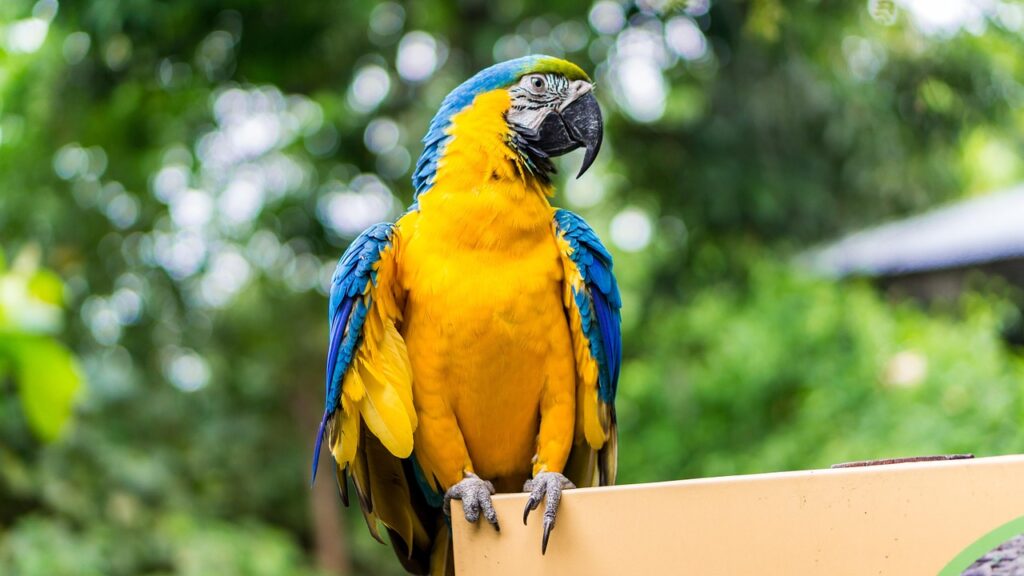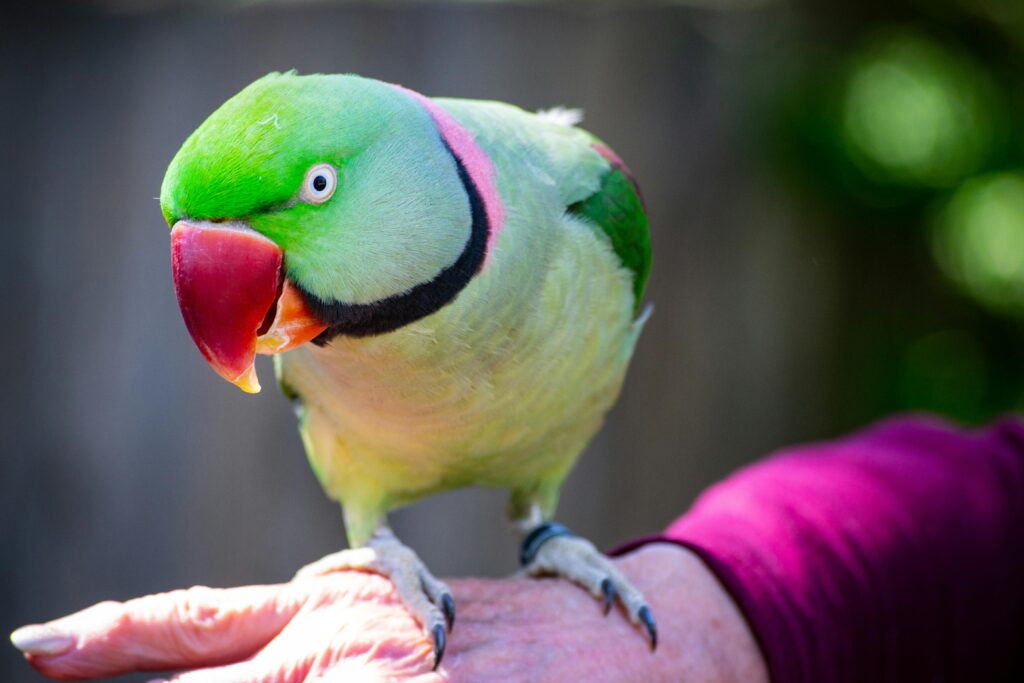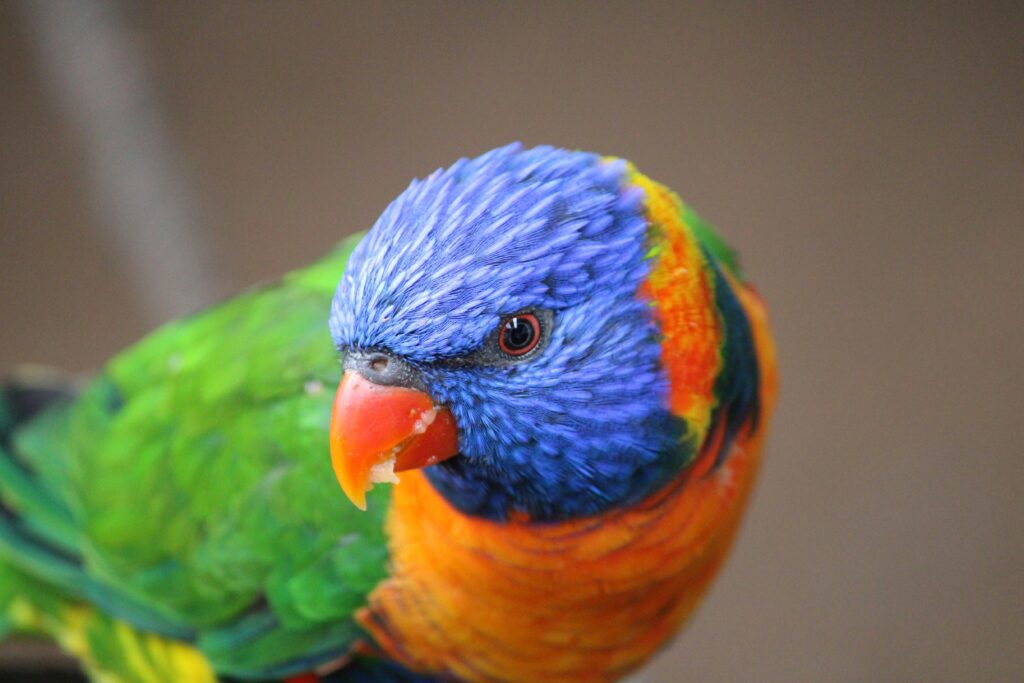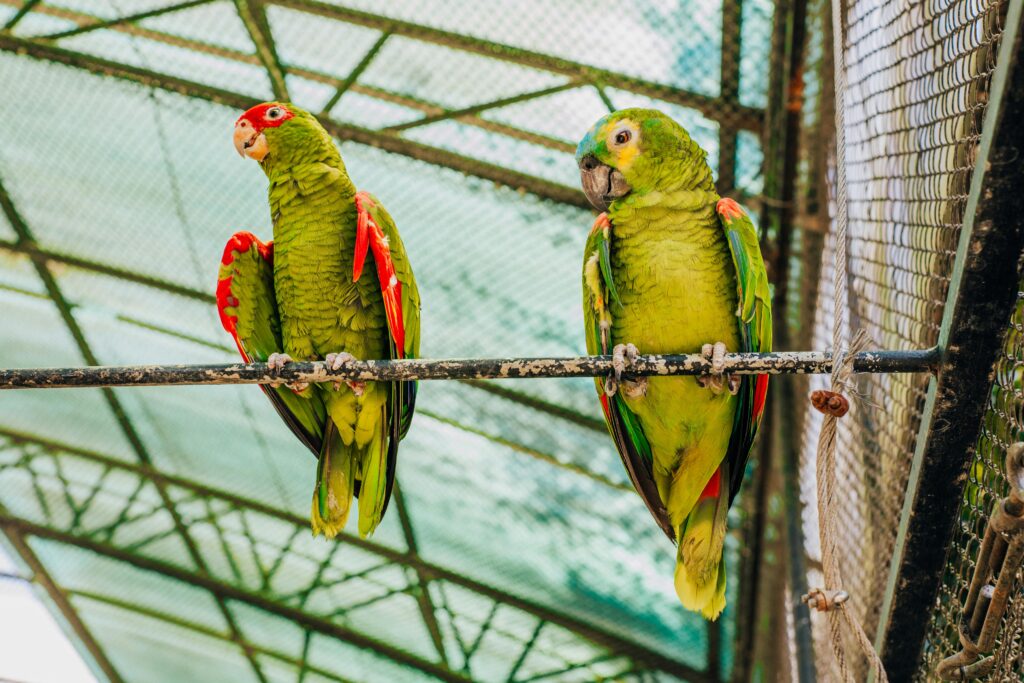1. Why Frequency Matters
Birds produce an average of 30 to 60 droppings per day, depending on their size, species, diet, and activity level. Birds process food quickly, which leads to frequent elimination. While this is natural, the accumulation of droppings can quickly create an unhealthy environment.
When left unattended, droppings begin to break down and release ammonia, a colorless gas that can irritate the sensitive respiratory systems of birds. According to VCA Animal Hospitals, birds are highly susceptible to airborne toxins due to their efficient, but delicate respiratory anatomy. Their lungs are connected to a system of air sacs, which makes it easy for gases like ammonia, mold spores, and bacteria to enter their bloodstream rapidly.
In humid environments, the risk escalates because:
Fungal spores (such as Aspergillus) thrive in warm, damp conditions, and can cause life-threatening respiratory infections like aspergillosis, especially in parrots, cockatiels, and African Greys.
Moisture accelerates bacterial growth in soiled cage liners, perches, and crevices.
Mold and mildew form quickly on organic material like wood and droppings.




Infographics showing the bird’s efficient but delicate respiratory system. Includes their air sacs, lungs, and pathways.
🚨 Signs Your Bird May Be Affected by Poor Cage Hygiene:
- Sneezing, wheezing, or open-mouth breathing
- Fluffed-up feathers and lethargy
- Watery or crusty eyes
- Discoloration or odd smell in droppings
- Refusal to eat or interact with toys
💡 At KIKO Birds, we’ve seen firsthand how quickly health can decline when cage hygiene is neglected. That’s why our cleaning schedule includes multiple daily checks, weekly sanitation, and monthly deep cleans—designed to prevent any buildup before it becomes dangerous.
🚨 How Poor Hygiene Harms Birds
- Ammonia burns respiratory epithelium: even low levels (10–25 ppm) slow cilia function; higher levels (50+ ppm) cause cilia death—reducing a bird’s ability to ward off airborne pathogens.
- Mucosal damage and airborne toxins can cause tight-junction breakdown in lungs, compromising immune defenses and triggering inflammation via NF-κB pathways poultryworld.net+6pubmed.ncbi.nlm.nih.gov+6pmc.ncbi.nlm.nih.gov+6.
- Secondary infections, such as airsacculitis, pneumonia, and conjunctivitis, become much more likely without proper hygiene poultryworld.net+2en.wikipedia.org+2grandvalley.com+2.
- Chronic exposure can suppress appetite, stunt growth, and reduce overall well-being birdful.org.
“Birds have a highly sensitive respiratory system…Keeping a very clean environment…is essential to maintaining their health.” — Reddit user in r/Pets happyparakeet.com+5reddit.com+5birdful.org+5
2. What You’ll Need for Spot, Routine & Deep Cleans
Daily Cleaning: cage liners, dishwasher-safe bowls, damp cloth
Weekly Cleaning: bird-safe spray cleaner, scrub brush, toothbrush
Monthly Cleaning hose or deep sink access, optional steam cleaner
Affiliate Products to Keep Handy:
- Nature’s Miracle Enzyme Cleaner • $6.79 – safe, effective, enzyme formula.
- Morning Bird Cage Clean • $13.99 – non-toxic and unscented.
- Bird Barrier Dissolve‑It Enzyme Cleaner • $81 – professional-grade concentrate.
- Vitakraft Super‑Absorbent Cage Liners • $7.99 – durable, replaceable daily liners.
3. Clean Like a Pro: Break It Down by Frequency
🧼 Daily Cleaning
- Swap liners
- Clean food/water dishes
- Wipe perches, bars, tray
- Remove stale fresh food
- Check for droppings and health cues (color, form)
At KIKO Birds, we do this twice daily for multi-bird suites—morning and evening.
🧽 Weekly Cleaning (3–5 days for large/multiple birds)
- Empty cage, soak and scrub grates
- Clean perches/toys with enzyme spray
- Sanitize tray and bars
- Rotate toys to enrich birds (important for parrots)
🧴 Monthly Deep Clean (or every 2–3 weeks in humid climates)
- Move cage outdoors or to utility sink
- Disassemble and hose off thoroughly
- Use enzyme cleaner or diluted bleach (1:32)
- Steam clean crevices (optional)
- Sun-dry completely to kill lingering pathogens
KIKO Birds protocol: Daily, weekly, and deep cleaning monthly—for large cages it becomes bi-weekly.
4. Cleaning by Bird Type
| Bird Type | Daily | Weekly | Monthly |
|---|---|---|---|
| Parakeets/Budgies | ✅ | ✅ | ✅ |
| Cockatiels/Conures | ✅ | ✅ | ✅ |
| Amazons/Macaws/Cockatoos | ✅ | ✅ | Every 2 weeks |
| Finches/Canaries | ✅ | ✅ | ✅ |
| Multiple Birds | 2× daily | 2× weekly | Every 2 weeks |
5. Safety & Non-Toxic Cleaner Tips
- Avoid bleach, aerosols, essential oils, phenols
- Vinegar + water + soap is a safe DIY alternative
- Always rinse well to eliminate residue
- Steam cleaning is effective and chemical-free
6. Stress-Free Cleaning for Birds
- Move bird to temporary safe cage or carrier
- Provide familiar toy and water
- Talk calmly, and play soft background music
- For new or anxious birds, reduce disruption by weekly instead of daily deep cleans
7. Video Guide: See It in Action
Watch this video on how to clean a bird cage:
8. FAQs
Q: Can I clean with the bird inside the cage?
A: Never. Remove birds during cleaning to avoid inhaling fumes or ingesting debris.
Q: How often should I disinfect?
A: Monthly with a bleach solution or enzyme cleaner—then rinse and dry completely .
Q: What if my bird is stressed?
A: Provide a safe carrier, familiar toy, talk softly, and keep routines consistent. For sensitive birds (e.g., finches), limit cage moves.
Q: Are steam cleaners safe?
A: Yes, when materials are heat-resistant. They sanitize without chemicals and are used monthly at KIKO Birds.
Q: Which liner is best?
A: Choose absorbent liners without sandpaper surfaces; gravel paper may help trim nails but avoid ingestion issues .
10. Cleaning Gear to Simplify Your Life
- Nature’s Miracle Enzyme Cleaner – $6.79
- Morning Bird Unscented Cleaner – $13.99
- Bird Barrier Dissolve‑It Cleaner (pro-grade) – $81.49
- Vitakraft Cage Liners (daily) – $7.99
Use affiliate links to support KIKO Birds!



